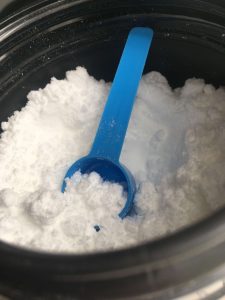Creatine is one of the most popular and widely used supplements within the fitness industry and with good reason! There have been no conclusive studies to show any long term negative health effects whilst the benefits of using it are numerous and include:
- Improved Strength.
- Improved Muscular endurance.
- Volumizes muscle cells to aid muscle growth.
- Raises the level of anabolic hormones to further aid muscle growth.
- Gives the muscles a fuller, rounder look for those training for aesthetic purposes.
These are just some brief and simplified examples of the benefits you can expect by supplementing creatine. This therefore leads us to the question of why is everyone not using this seemingly magical white powder?
One reason, and perhaps the main deterrent is the fact that once you start taking creatine you WILL start gaining weight.
Does creatine make you gain weight? Creatine will make you gain weight in the form of water retention. This is however cellular water retention in the muscles and therefore should not be mistaken with fat gain. Water retention in the muscles is beneficial for training and muscle growth so is actually a positive side effect.
Unless your physique goal is to purely put on size (If this is you then start taking creatine), the idea of taking something that will then make you gain weight is not an appealing one.
Before looking into the weight gain caused by creatine it’s important to first understand what creatine is and why you would use it as a supplement.
Table of Contents
How Does Creatine Work
When the body uses energy for muscular contractions, primarily through weight training, a molecule called ATP (Adenosine triphosphate) is what is used as this source of energy.
During a set of repeated muscular contractions this energy source gets depleted and creatine (stored in muscle cells), acts as a backup energy source to regenerate ATP allowing you to get a few extra reps out of your set.
This is an incredibly brief explanation of how it works, if you want to get a better understanding of the science behind this process then you can find this here.
The main point we want to look at is the fact that creatine is stored in the muscle cells and just what effect this actually has.
Creatine is a muscle osmolyte and a function of this involves drawing water into the muscle cell to maintain cell volume. We already naturally store a certain amount of creatine that we get from our diet, with red meat, fish and pork being the main sources.
The average person holds 1.7g of creatine for every kilogram of bodyweight however we have a maximum capacity of 2.3g per kilogram of bodyweight so on average we are some way off this level!
Note: This is why creatine exists as a supplement and why it is so popular, you want to maximise your creatine stores to get the maximum possible benefit. Much in the same way you want to maximise your time in the gym by creating a good workout program!
What This Means
As mentioned above, creatine draws water from the blood into muscle cells increasing cell volume. Once you increase the creatine concentration in your muscles through supplementation, a direct result of this is that you will retain more water.
This increased concentration of creatine in your muscles will draw more water into the muscle cells. It’s worth noting however that the primary function of creatine is to replenish ATP stores and not directly to retain water.
This is the reason that creatine is perceived to “make you gain weight”. When people think of weight gain the first assumption (and a negative one) is that because you’ve stepped on the scale and it has gone up you must have put on fat, we live in an age where people don’t want to see the scale go up unless you are in a bulking phase.
When supplementing creatine a common practice is to go through an initial loading phase which involves taking 20g daily for the first 5 days (consumed in 4 x 5g servings throughout the day) to rapidly fill your creatine concentration.
This is then followed by 5g taken daily to maintain stores. The other option is to ignore the loading phase and take 5g daily which will fully concentrate stores after around 4 weeks.
Note: Recommended dosage varies between 3g – 5g daily, 5g daily is considered the maximum dosage needed outside of a loading period.
Does Creatine Make You Gain Weight

Supplementing with creatine will mean that a vast majority of people gain weight however this is not something that you should be concerned with.
Below I’ll cover how much weight you could expect to gain, how long it will last but also (and more importantly) the benefits of supplementing with creatine.
How Much Weight Do You Gain From Creatine
Whether you choose to do an initial pre-loading phase or choose to take a gradual approach and stick to the 5g a day limit it’s still important to note that both approaches will see most people gain weight.
This is not a guarantee, as with most supplements everyone will respond differently and while some might gain a significant amount of weight (due to a higher amount of lean muscle mass) others might not see any weight gain at all.
On average though you can expect to gain a few pounds of body weight when you first start supplementing with creatine.
When using a loading phase you will put on between 1lb – 5lb within a week though this will vary for each individual, those that have more lean muscle mass have more potential to retain water in the cell.
This rapid and quite substantial weight gain is a result of your body retaining much more water inside the muscle cells.
If you ignore the initial loading phase you can still expect to gain 1lb – 3lb within your first week, though it will be a more gradual increase over a few weeks as your body reaches its full creatine concentration stores rather than an initial rapid gain in weight.
How Long Does Creatine Weight Gain Last
It’s very important to note that the weight gain is water retention and not body fat when you supplement with creatine and this will significantly impact how long the weight gain will last and ultimately how long it would also take to lose.
The first point to make is that as long as you continue to supplement with 3g – 5g daily then you will maintain the cell volume and weight that you initially gained as long as you maintain your hydration levels.
This is a key point that I’ve not yet mentioned but your muscles are made up of around 70%-75% of water and keeping your hydration levels high will maintain this cell volume in the muscles as well as your body weight.
Therefore the length of time that the creatine weight gain lasts will entirely depend upon your hydration levels and also carb intake to an extent (for every 1g of carbs you consume you would store roughly 2g-3g of water as a result).
Supplementing creatine does not directly cause weight gain, it’s an indirect result and therefore the weight gained will depend on other factors like diet, hydration and training intensity.
Secondly it’s important to note that weight gain is not body and therefore shouldn’t be confused. Body fat takes much longer to lose than water weight and therefore the weight gain from creatine can be temporary and easy to lose.
Benefits of Supplementing Creatine
Though it’s true that supplementing creatine will see you gain weight, the benefits it brings far outweigh the fact that you’ve put on weight (it’s only water weight as well, this can be dropped within a few days unlike fat which takes weeks/months to drop).
I’d go as far as saying that creatine would be my number 1 recommendation as a supplement, especially for beginners and below are just a few of the benefits from taking it.
- Creatine draws water into the muscle cells to increase cell volume, this type of cellular growth is known as sarcoplasmic hypertrophy. Though this has no direct effect on muscular strength/performance your muscles have actually grown so this is ideal from an aesthetic viewpoint!
- After the initial weight gain, further long term weight gain will be lean muscle tissue (excluding other variables such as a bad diet). Because creatine acts as a backup energy source allowing you to get a few extra reps you will progress quicker in the gym than if you were not supplementing it. More reps = more muscle fibres recruited = more muscle hypertrophy = more muscle growth.
- Creatine Monohydrate (my recommendation) is one of cheapest and most researched supplements on the market. If you try it and don’t see any benefits from it then you can simply stop taking it with little monetary loss.
Yes supplementing creatine will see you gain some weight, however the benefits from it far outweigh the initial and manageable water weight that you will gain. My advice would be to ignore the scale and invest in a supplement that has proven health and performance benefits.
Also check out:
Creatine 101
What Next
If you are looking to make changes to your physique by either losing body fat, building muscle or looking to maintain a lean physique then sign up to my weekly newsletter below. Each week I send out actionable tips to help you lose that extra 1lb of fat or build that extra 0.5lb of muscle mass on a weekly basis.
If you sign up now you’ll also receive my 28 day body recomp program completely Free. This ebook will be sent straight to your inbox and will provide an intense 28 day program aimed at helping you lose up to 8lbs of body fat whilst also building 2lb-4lb of lean muscle mass in just 4 weeks.
Don’t worry if you’re not ready for an intense program just yet, my weekly newsletter will give smaller tips that when implemented daily, will stack up over time and see you transform your body with seemingly minimal effort!
References
http://www.ncbi.nlm.nih.gov/pubmed/21512399
http://www.ncbi.nlm.nih.gov/pubmed/21744011
http://www.ncbi.nlm.nih.gov/pubmed/17943308
1) Hultman, E.. Bergstrom, J. & McLennon-Anderson, N. Breakdown and resynthesis of phosphorylcreatine and adenosine triphosphate in connection with muscular work in man. Scand. J. Clin. Lab. Invest. 1967; 19, 56-66
